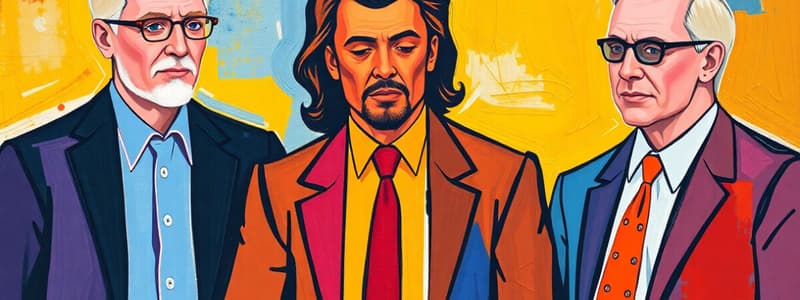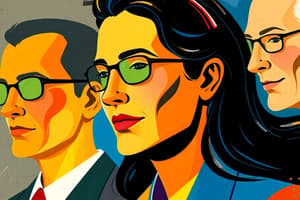Podcast
Questions and Answers
What did Max Weber advocate in his theory of bureaucracy?
What did Max Weber advocate in his theory of bureaucracy?
- Relaxation of authority and rules
- Flexible management structures
- Elimination of regulations for personnel
- Need for legalized, formal authority (correct)
Which management function involves determining goals, objectives, and policies?
Which management function involves determining goals, objectives, and policies?
- Organizing
- Directing
- Planning (correct)
- Controlling
What is the focus of the staffing function in management activities?
What is the focus of the staffing function in management activities?
- Creating budgets and forecasts
- Performance evaluations
- Aligning objectives across departments
- Recruiting and hiring staff (correct)
What does the principle of 'unity of command' emphasize?
What does the principle of 'unity of command' emphasize?
Which principle of management stresses the importance of placing organizational goals above individual interests?
Which principle of management stresses the importance of placing organizational goals above individual interests?
What added activities did Luther Gulick include in the management functions?
What added activities did Luther Gulick include in the management functions?
Which management function is primarily concerned with monitoring and evaluating performance?
Which management function is primarily concerned with monitoring and evaluating performance?
What principle refers to the right to command balanced with responsibility?
What principle refers to the right to command balanced with responsibility?
What does the scalar chain or line of authority refer to?
What does the scalar chain or line of authority refer to?
What principle emphasizes the importance of fairness, kindness, and respect in the workplace?
What principle emphasizes the importance of fairness, kindness, and respect in the workplace?
Who was one of the first theorists to suggest participative management?
Who was one of the first theorists to suggest participative management?
What do the illumination studies focused on?
What do the illumination studies focused on?
What does Theory X suggest about management attitudes towards employees?
What does Theory X suggest about management attitudes towards employees?
According to Chris Argyris, what happens if self-esteem needs of employees are unmet?
According to Chris Argyris, what happens if self-esteem needs of employees are unmet?
What does the Great Man Theory imply?
What does the Great Man Theory imply?
Which theorist is associated with scientific management?
Which theorist is associated with scientific management?
What do trait theories suggest about certain individuals?
What do trait theories suggest about certain individuals?
Which of the following is NOT considered a trait associated with effective leadership?
Which of the following is NOT considered a trait associated with effective leadership?
What defines a formal leader?
What defines a formal leader?
What is a characteristic of an autocratic leader?
What is a characteristic of an autocratic leader?
Which type of leader is known for allowing complete freedom to their team?
Which type of leader is known for allowing complete freedom to their team?
Which leadership style involves centralized decision-making and control?
Which leadership style involves centralized decision-making and control?
Which leadership theory emphasizes that leadership can develop through education and practice?
Which leadership theory emphasizes that leadership can develop through education and practice?
What type of leader is recognized by the group due to special abilities or seniority, even if they are not formally appointed?
What type of leader is recognized by the group due to special abilities or seniority, even if they are not formally appointed?
What represents a leader's vision?
What represents a leader's vision?
What is the primary function of first-level managers?
What is the primary function of first-level managers?
How is influence characterized within effective leadership?
How is influence characterized within effective leadership?
What role do middle-level managers serve in an organization?
What role do middle-level managers serve in an organization?
Which of the following characteristics describes a good leader?
Which of the following characteristics describes a good leader?
Who primarily establishes goals and develops strategic plans in an organization?
Who primarily establishes goals and develops strategic plans in an organization?
What is a key responsibility of nursing management?
What is a key responsibility of nursing management?
Which of the following is not a role of first-level managers?
Which of the following is not a role of first-level managers?
What is primarily the role of a leader?
What is primarily the role of a leader?
Which characteristic is NOT typically associated with effective leaders?
Which characteristic is NOT typically associated with effective leaders?
What distinguishes a manager from a leader?
What distinguishes a manager from a leader?
Which aspect is emphasized more by management compared to leadership?
Which aspect is emphasized more by management compared to leadership?
Flashcards are hidden until you start studying
Study Notes
Leadership
- Leaders inspire and influence collective efforts toward shared objectives.
- Key traits include vision, informed decision-making, effective communication, confidence, and self-awareness.
- Strong interpersonal skills—particularly listening and communicating—are essential for successful leadership.
Management
- Managers hold organizational authority and responsibility for planning, organizing, coordinating, and directing staff.
- They manage human, financial, and material resources, set goals, make decisions, and are tasked with problem-solving and implementing change.
Leadership vs. Management
- Leadership focuses on motivating and influencing people towards a collective goal without formal authority.
- Management emphasizes organizational structure and resource control to achieve defined objectives with direct authority.
- Leaders may have varied goals compared to organizational objectives, while managers maintain accountability for results.
Development of Management Theories
- Scientific Management (Frederick W. Taylor): Stresses efficient task performance through scientific analysis, promoting competencies and teamwork.
- Bureaucracy (Max Weber): Advocates for formal authority, established rules, and organizational framework for personnel management.
Management Functions
- Henri Fayol defined management functions as planning, organizing, commanding, coordinating, and controlling.
- Luther Gulick expanded Fayol’s functions into seven activities—planning, organizing, staffing, directing, coordinating, reporting, and budgeting.
Activities of Management
- Planning: Establishes goals, objectives, and fiscal strategies.
- Organizing: Structures resources and activities effectively for goal achievement.
- Staffing: Involves recruitment, training, and staff development.
- Directing: Focuses on motivation, communication, and conflict management.
- Controlling: Encompasses performance evaluation, financial accountability, and quality assurance.
14 Principles of Management (Henri Fayol)
- Specialized division of work promotes efficiency.
- Authority aligns with responsibility for leadership accountability.
- Disciplined conduct from management fosters employee obedience.
- Unity of command avoids conflicting directives.
- Unity of direction aligns group activities toward common objectives.
- Organizational goals supersede individual interests.
- Fair remuneration is a key motivator.
- Centralization or decentralization is conditional based on business context.
- Clear hierarchy establishes order and authority.
- Structured environments enhance operational effectiveness.
- Fair treatment builds equity among employees.
- Stability in personnel reduces turnover and enhances productivity.
- Initiative in employees encourages empowerment and plan development.
- Team spirit fosters unity and collaboration among staff.
Participative Management
- Mary Parker Follett introduced participative decision-making, promoting collaborative authority between managers and employees.
- Hawthorne Effect (Elton Mayo) revealed productivity increases when workers feel observed and valued.
- Theory X and Y (Douglas McGregor) associates managerial attitudes with employee satisfaction levels.
Leadership Theories
- Great Man Theory: Suggests that leaders are inherently born with attributes that enable them to lead effectively.
- Trait Theories: Identify specific characteristics, such as intelligence and decisiveness, that predict leadership effectiveness.
Types of Leaders
- Formal Leaders: Appointed with official authority within an organization.
- Informal Leaders: Recognized by peers due to experience or ability, influencing team dynamics without formal authority.
Classic Leadership Styles
- Autocratic: Centralizes decision-making and maintains strict control.
- Democratic: Encourages participation and values input from team members.
- Laissez-faire: Offers minimal supervision, allowing group autonomy.
- Bureaucratic: Adheres strictly to rules and guidelines.
Principles of Effective Leadership
- Vision: Articulates a clear and inspiring future state for followers.
- Influence: Gains cooperation through trust and effective communication.
- Role Model: Serves as an exemplar, fostering dignity and mutual respect among team members.
Nursing Management
- Involves the governance and decision-making processes impacting nursing organizations.
- Functions encompass planning, organizing, staffing, directing, and controlling nursing activities.
Levels of Management
- First Level Managers: Oversee non-managerial staff and daily operations.
- Middle-Level Managers: Supervise first-level managers and bridge departmental activities.
- Upper-Level Managers: Set strategic goals and oversee organizational leadership.
Examples of Management Roles
- First Level: Charge nurses, team leaders.
- Middle-Level: Nurse managers, department heads.
- Upper-Level: Chief nursing officers, vice presidents for nursing.
Studying That Suits You
Use AI to generate personalized quizzes and flashcards to suit your learning preferences.




